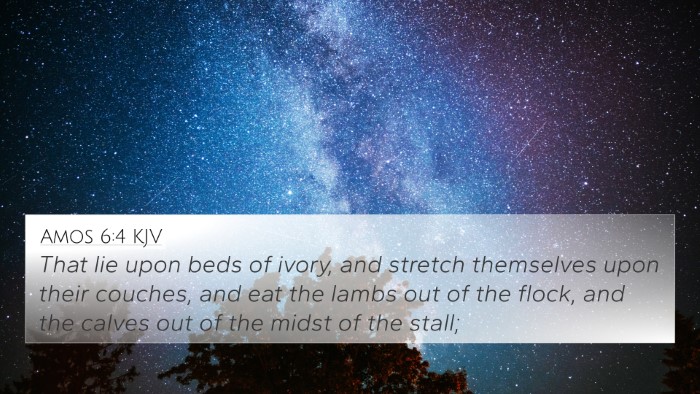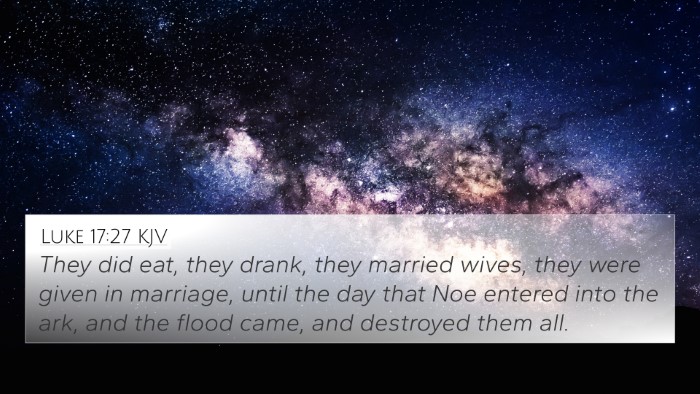Understanding Jeremiah 16:8
Bible Verse: Jeremiah 16:8 - "You shall not go into the house of mourning, nor go to lament or bemoan them; for I have taken away My peace from this people," says the LORD, "lovingkindness and mercies."
Summary of Jeremiah 16:8 Meaning
The verse from Jeremiah emphasizes God's command to the prophet regarding the mourning practices of the people of Judah. God instructs Jeremiah not to participate in the mourning rituals due to the impending judgment on the nation. This reflects a significant theme in the book of Jeremiah, which is the warning of divine punishment for the people's unfaithfulness.
Commentaries Insights
Matthew Henry's Commentary:
- Henry illustrates that God’s absence of peace indicates severe consequences for the nation.
- He stresses that God is distancing Himself from those who persist in sin, symbolizing a lack of His mercies.
- Henry notes that mourning for the deceased is discouraged because it symbolizes a greater loss—the loss of God’s favor.
Albert Barnes' Notes:
- Barnes explains that God’s direct command to avoid mourning signifies that normal social practices are inappropriate in light of the nation's transgressions.
- He emphasizes that the peace and compassion that were once the nation’s blessings are now removed, portraying a state of despair.
- Barnes also connects this lack of peace with the broader theological themes of judgment and repentance found throughout Scripture.
Adam Clarke's Commentary:
- Clarke elaborates that Jeremiah's prohibition from the house of mourning represents the seriousness of the situation and the drastic need for the people to turn back to God.
- He points out that God’s lovingkindness is being replaced by justice, highlighting the dual nature of God's character.
- Clarke also reinforces the idea that true mourning should lead to repentance rather than superficial grief.
Cross-References Related to Jeremiah 16:8
- Isaiah 57:21 - "There is no peace," says my God, "for the wicked."
- Jeremiah 4:14 - "O Jerusalem, wash your heart from wickedness, that you may be saved."
- Matthew 5:4 - "Blessed are those who mourn, for they shall be comforted."
- Lamentations 3:22-23 - "The steadfast love of the Lord never ceases; His mercies never come to an end."
- Ezekiel 24:16 - "Son of man, behold, I take away from you the desire of your eyes..."
- Hosea 4:6 - "My people are destroyed for lack of knowledge..."
- 2 Chronicles 7:14 - "If my people, who are called by my name, will humble themselves and pray..."
- Psalm 51:17 - "The sacrifices of God are a broken spirit; a broken and contrite heart..."
Contextual Connections and Thematic Analysis
This verse is part of a larger narrative that conveys God’s displeasure with His people and the call to repentance. The lack of peace is both a consequence of rebellion and a critical reminder of the need for genuine repentance and a return to divine favor. Key themes arise including:
- Judgment and Mercy: The tension between God's justice and His desire to extend mercy.
- True Mourning: The distinction between societal norms of grief and spiritual mourning that leads to transformation.
- Divine Absence: The implications of God's withdrawal of peace and the ensuing chaos that follows unfaithfulness.
- The Role of the Prophet: Jeremiah as a voice calling the nation back to true worship and understanding of their sin.
Tools for Cross-Referencing Biblical Texts
For deeper insight and comprehension of Bible verses, utilizing a Bible concordance can be immensely helpful. A scripture cross-reference guide aids in finding connecting themes and verses across both the Old and New Testaments.
How to Use Bible Cross-References
Proper cross-referencing techniques foster a clearer understanding of the text and deepen one’s study:
- Identify Themes: Look for central themes that connect various verses (ex: mourning, judgment).
- Use Digital Tools: Access online Bible reference resources that provide extensive chains of connected verses.
- Comparative Analysis: Examine verses that discuss similar topics to gain a fuller theological perspective.
- Engage with Commentaries: Read different commentaries to enrich understanding and uncover new insights.
Conclusion
Jeremiah 16:8 serves not only as a historical text but as a profound reflection on the relational dynamics between God and His people. Through the voices of esteemed commentators, we gain a multifaceted understanding of sin, judgment, and the pathway toward redemption. By utilizing tools for cross-referencing and engaging with scripture deeply, believers can explore the connections between biblical texts to enrich their faith journey.











